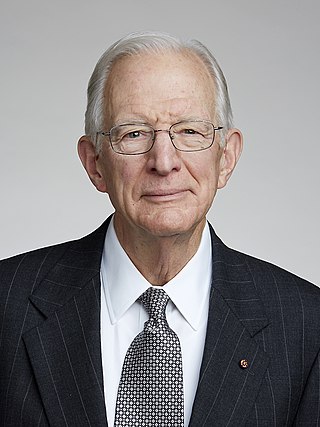
Manfred Eigen was a German biophysical chemist who won the 1967 Nobel Prize in Chemistry for work on measuring fast chemical reactions.

Bert Sakmann is a German cell physiologist. He shared the Nobel Prize in Physiology or Medicine with Erwin Neher in 1991 for their work on "the function of single ion channels in cells," and the invention of the patch clamp. Bert Sakmann was Professor at Heidelberg University and is an Emeritus Scientific Member of the Max Planck Institute for Medical Research in Heidelberg, Germany. Since 2008 he leads an emeritus research group at the Max Planck Institute of Neurobiology.

Klaus von Klitzing is a German physicist, known for discovery of the integer quantum Hall effect, for which he was awarded the 1985 Nobel Prize in Physics.

Hartmut Michel is a German biochemist, who received the 1988 Nobel Prize in Chemistry for determination of the first crystal structure of an integral membrane protein, a membrane-bound complex of proteins and co-factors that is essential to photosynthesis.

The Max Planck Institute for Chemistry is a non-university research institute under the auspices of the Max Planck Society in Mainz, Germany. It was created as the Kaiser Wilhelm Institute for Chemistry in 1911 in Berlin.

Reinhard Genzel is a German astrophysicist, co-director of the Max Planck Institute for Extraterrestrial Physics, a professor at LMU and an emeritus professor at the University of California, Berkeley. He was awarded the 2020 Nobel Prize in Physics "for the discovery of a supermassive compact object at the centre of our galaxy", which he shared with Andrea Ghez and Roger Penrose. In a 2021 interview given to Federal University of Pará in Brazil, Genzel recalls his journey as a physicist; the influence of his father, Ludwig Genzel; his experiences working with Charles H. Townes; and more.

Daan Frenkel is a Dutch computational physicist in the Department of Chemistry at the University of Cambridge.
Professor Henry "Harry" Elderfield, was Professor of Ocean Chemistry and Palaeochemistry at the Godwin Laboratory in the Department of Earth Sciences at the University of Cambridge. He made his name in ocean chemistry and palaeochemistry, using trace metals and isotopes in biogenic carbonate as palaeochemical tracers, and studying the chemistry of modern and ancient oceans - especially those of the glacial epoch and the Cenozoic.
Bernard (Bernie) Wood is a British geologist, and professor of mineralogy and senior research fellow at the University of Oxford. He specializes in the thermodynamics of geological systems, using experimental techniques. He is a prominent figure in the field of experimental petrology, having received multiple awards throughout his career and taught at several universities worldwide.

Ulrich "Uli" Pöschl is an Austrian chemist who was appointed Director of the newly founded Department of Multiphase Chemistry at the Max Planck Institute for Chemistry in Mainz, Germany on 1 October 2012.

Roger Sidney Goody is an English biochemist who served as director at the Max Planck Institute for Molecular Physiology in Dortmund from 1993 until 2013. Since 2013 he is Emeritus Director of the institute.
Suzanne Yvette O'Reilly is an Australian professor of geology noted for her pioneering contributions to mapping the deep Earth with an interdisciplinary approach. In 2007, the Royal Society of New South Wales awarded her the Clarke Medal for outstanding contributions to Australian geology. She has over 350 peer-reviewed publications with over 40,000 citations, and has supervised more than 40 PhD students to graduation.
Meinrat O. Andreae, born in 1949 in Augsburg, is a German biogeochemist. Since 1987, he has worked as Director and Scientific Member at the Max Planck Institute for Chemistry (MPIC) in Mainz.
Gao Shan was a Chinese geochemist and academician of the Chinese Academy of Sciences (CAS). He was a professor of geochemistry at the China University of Geosciences (Wuhan).

John Michael Hayes was an American oceanographer. He worked at Indiana University Bloomington, and Woods Hole Oceanographic Institution in Woods Hole, Massachusetts.
Edward Bruce Watson is an American geochemist at Rensselaer Polytechnic Institute in Troy, New York.

Roberta L. Rudnick is an American earth scientist and professor of geology at the University of California, Santa Barbara. She was elected a member of the National Academy of Sciences in 2010 and was awarded the Dana Medal by the Mineralogical Society of America. Rudnick is a world expert in the continental crust and lithosphere.
Arndt Simon is a German inorganic chemist. He was a director at the Max Planck Institute for Solid State Research in Stuttgart.
Stanley Robert Hart is an American geologist, geochemist, leading international expert on mantle isotope geochemistry, and pioneer of chemical geodynamics.
Catherine Chauvel is a geochemist at the Institut de Physique du Globe de Paris known for her research on the impact of volcanic activity on the chemistry of the mantle, continental crust, and island arc geochemistry.











